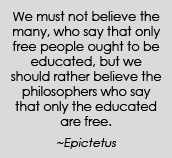|
 |
"In
my early professional years I was asking the
question: How can I treat, or cure, or change
this person? Now I would phrase the question in
this way: How can I provide a relationship which
this person may use for his own personal
growth?" |
|
Carl Rogers is widely recognized as the author and
father of client-centered therapy and student-centered
education. The impact of his life and work simply cannot
be overstated. His writing and scholarship significantly
influenced many aspects of Process Education,
particularly the idea of faculty as facilitators
of learning who also accept responsibility for
facilitating the growth and success of their students.
Rogers states that, "the facilitation of significant
learning rests upon certain attitudinal qualities which
exist in the personal relationship between the
facilitator and the learner" (Freedom to Learn for
the 80s, as cited in "Carl Rogers: 1902-1987"
by Fred Zimring1).
These attitudinal qualities are:
-
Realness or genuineness
-
Prizing the learner (caring for the learner,
accepting the learner, trusting the learner, valuing
the worth of the learner)
-
Empathic understanding
It is worth reading what Rogers himself has to say about
these qualities and the impact they have upon learning
and growth (from Freedom to Learn for the 80s):
Perhaps the most basic of these essential attitudes is
realness or
genuineness. When the
facilitator is a real person being what he is, entering
into a relationship with the learner without presenting
a front or facade, he is much more likely to be
effective...Thus, he is a person to his students, not a
faceless embodiment of a curricular requirement, nor a
sterile tube through which knowledge is passed from one
generation to another (p. 106)...
There is another attitude which stands out in those who
are successful in facilitating learning. I have observed
this attitude. I have experienced it. Yet it is hard to
know what term to put to it, so I will use several. I
think of it as prizing the learner,
prizing his feelings, his opinions, his person. It is a
caring for the learner, but
a non-possessive caring. It is an
acceptance of this other
individual as a separate person,
having worth in his own right.
It is a basic trust a belief that
this other person is somehow fundamentally trustworthy.
Whether we call it prizing, acceptance, trust or some
other term, it shows up in a variety of observable ways.
The facilitator who has a considerable degree of this
attitude can be fully acceptant of the fear and
hesitation of the student as he approaches a new problem
as well as acceptant of the pupilís satisfaction in
achievement. Such a teacher can accept the studentís
occasional apathy, his erratic desires to explore the
by-roads of knowledge, as well as his disciplined
efforts to achieve major goals. He can accept personal
feelings which both disturb and promote learning
órivalry with a sibling, hatred of authority, concern
about personal adequacy. What we are describing is a
prizing of the learner as an imperfect human being with
many feelings, many potentials. The facilitatorís
prizing or acceptance of the learner is an operational
expression of his essential confidence and trust in the
capacity of the human organism (p. 109)...
A further element which establishes a climate for
self-initiated, experiential learning is
empathic understanding.
When the teacher has the ability to understand the
studentís reaction from the inside, has a sensitive
awareness of the way the process of education and
learning seems to the student, then again the likelihood
of significant learning is increased.
This kind of understanding is sharply different from the
usual evaluative understanding which follows the pattern
of ĎI understand what is wrong with youí. When there is
a sensitive empathy, however, the reaction in the
learner follows something of this pattern, Ďat last
someone understands how it feels and seems to be me
without wanting to analyze me or judge me. Now I can
blossom and grow and learn.í (p. 111-112)
We are grateful for his work and contributions to the
ongoing transformation of education and the dignity of
the individual, and are proud to officially recognize
and salute Dr. Carl Rogers.
1published
in Prospects: the quarterly review of comparative
education (Paris, UNESCO: International Bureau of
Education), vol. XXIV, no. 3/4, 1994, p. 411-22.
Available at:
http://www.ibe.unesco.org/publications/ThinkersPdf/rogerse.PDF


